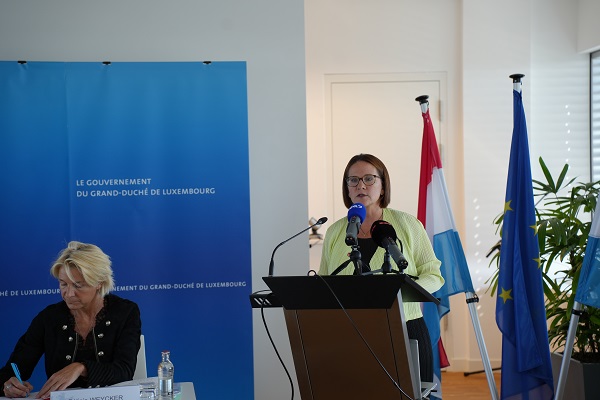 (L-R) Félicie Weycker, Ministry of Mobility and Public Works; Yuriko Backes, Luxembourg's Minister for Mobility and Public Works;
Credit: MMTP
(L-R) Félicie Weycker, Ministry of Mobility and Public Works; Yuriko Backes, Luxembourg's Minister for Mobility and Public Works;
Credit: MMTP
On Thursday 18 September 2025, Luxembourg's Minister for Mobility and Public Works, Yuriko Backes, presented a draft bill to modernise the legal framework of the evolving sector of taxis and chauffeur-driven cars (VLC).
According to Luxembourg's Ministry of Mobility and Public Works, the draft bill aims to optimise the sector of paid occasional passenger transport, covering both taxis and VLC (e.g. Uber and similar services), and harmonise the existing legal framework.
This initiative is in line with the shared objectives set out in the 2023-2028 coalition agreement and responds to the rapid evolution of the sector, marked by digitalisation, the emergence of new players and growing demand from both customers and professionals for a flexible and available service at all times, price transparency, and a quality service offering.
The bill will be submitted to the Chamber of Deputies (parliament) shortly.
"This ambitious reform aims to modernise the occasional paid transport sector, strengthen the rights of both customers and professionals, and promote innovation and healthy and fair competition in a changing sector," explained Minister Backes.
Thanks to the new pricing principles, increased transparency is expected to benefit customers. Furthermore, the regulated opening of the sector to booking intermediaries should not only stimulate competition, but also expand the choice offered to consumers by providing an incentive to reduce fares, according to the ministry.
"The background throughout the discussions and negotiations was the respect of labour law and the maintenance of social benefits," noted Minister Backes. "For me, this was an essential and non-negotiable condition for achieving a reform in the interest of the sector and its customers. I am therefore delighted that the bill guarantees this condition."
The conclusions of the work leading to this outcome are based on open consultation with all stakeholders, including the Taxi Federation, the Chamber of Skilled Trades and Crafts, the Luxembourg Federation of Bus and Coach Operators (FLEAA), trade unions, booking intermediaries and the relevant public administrations. As a result of this dialogue, the ministry expects that the measures decided upon will ensure "a clear, effective and modern reform", providing for a transitional phase of gradual adaptation while complying with European obligations.
Upon its entry into force, a numerus clausus for taxi and VLC licences will be implemented until 2030, with a gradual increase.
According to the ministry, the reform thus aims to optimise and significantly transform a sector requiring restructuring adapted to today's society, focusing on seven main objectives, namely to:
- modernise and harmonise the legal framework;
- incentivise price reductions by promoting competition;
- ensure transparency and strengthen customer protection;
- increase service quality;
- promote the ecological transition;
- simplify administrative procedures;
- encourage technological innovation.
To achieve these objectives, a set of ten measures has been proposed to ensure the efficient implementation of the reform:
- extension of the legal framework to chauffeur-driven cars (VLC);
- removal of geographic zones;
- transitional numerus clausus and gradual liberalisation;
- harmonisation and transparency of pricing;
- digitalisation of administrative procedures;
- strengthen driver training;
- regulation of booking intermediaries;
- customer protection and complaints management;
- environmental incentives;
- licences for scientific testing.








